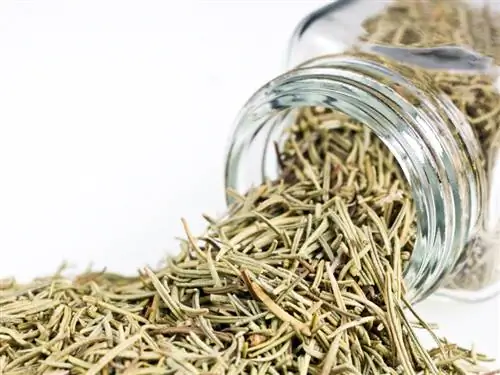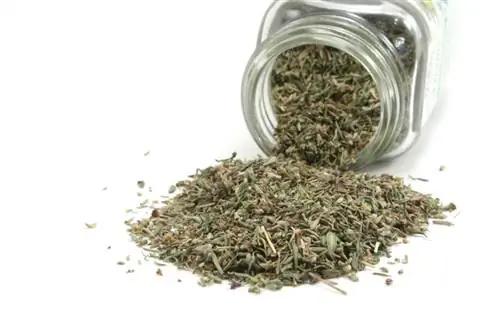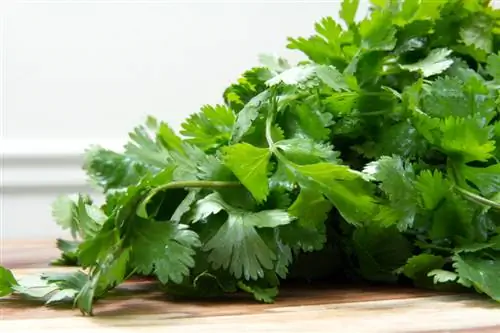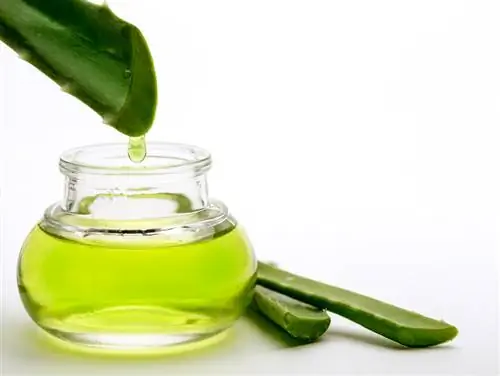- Author admin leonars@hobbygardeners.com.
- Public 2023-12-16 16:46.
- Last modified 2025-06-01 06:02.
Rosemary tastes very aromatic fresh from the bush, but can also be preserved in various ways. You should then store the herb in a dark place, as exposure to sunlight causes the sensitive essential oils to evaporate. The best way to store dried rosemary is in airtight containers.
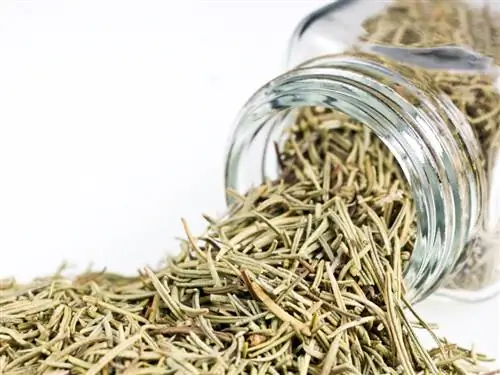
How to preserve rosemary?
Rosemary can be preserved in various ways: dried rosemary by air drying or in the oven, frozen in freezer bags or oil ice cubes and preserved in vinegar or oil. This way the aroma is retained and can be used in many different ways.
Drying rosemary
To dry rosemary, first harvest a few whole branches. Make sure that they are dry - after all, moisture leads to mold formation. Tie the branches together into small bouquets and hang them upside down in a warm, dark place, for example in the boiler room. The dried rosemary is stored - either whole or chopped - in airtight containers in a dark place.
How to do it faster: drying in the oven
If you don't have the space or patience to dry rosemary hanging, you can also do this in the oven. To do this, preheat the oven to a maximum of 50 °C and spread the rosemary sprigs on an oven tray lined with baking paper. Slide the baking tray onto the top shelf of the oven and clamp a wooden spoon or a bottle cap between the door and the oven - this will allow any moisture that escapes to escape easily. The rosemary now needs to dry for between two and four hours, whereby you should turn the branches about every half to an hour.
Freeze rosemary
Rosemary is one of the herbs that can be frozen without major loss of flavor. You can either freeze entire branches (in freezer bags) or just the needles in appropriate containers. Rosemary needles are particularly tasty if you put them in ice cube trays and top them with a good olive oil. These herb cubes can be used in many ways, for example for rosemary potatoes or Mediterranean stews. Frozen rosemary lasts for about a year, but loses its flavor within a few months and should therefore be used quickly.
Pick rosemary in vinegar or oil
Alternative - and a very original gift idea - are aromatic rosemary oils or rosemary vinegar. For pickling in oil, the rosemary sprigs should be fresh but dry. Use a good quality olive oil and make sure to completely cover the herbs with oil. White wine vinegar is particularly suitable for pickling in vinegar; here too, the herb branches are completely covered with vinegar. The mixtures must rest well in a cool, dark place for at least two weeks.
Tips & Tricks
How to make rosemary or herb s alt yourself: Weigh very finely two sprigs of rosemary, thyme, lovage and marjoram as well as six leaves of sage, a few crushed juniper berries and crushed black peppercorns. Now take an easily sealable, clean container (e.g. with a screw lid) and alternately layer s alt and herb mixture there in a ratio of 1:5, i.e. H. For every five parts of herbs there is one part of s alt. Coarse sea s alt is particularly suitable.

